
loading...

loading...
slide
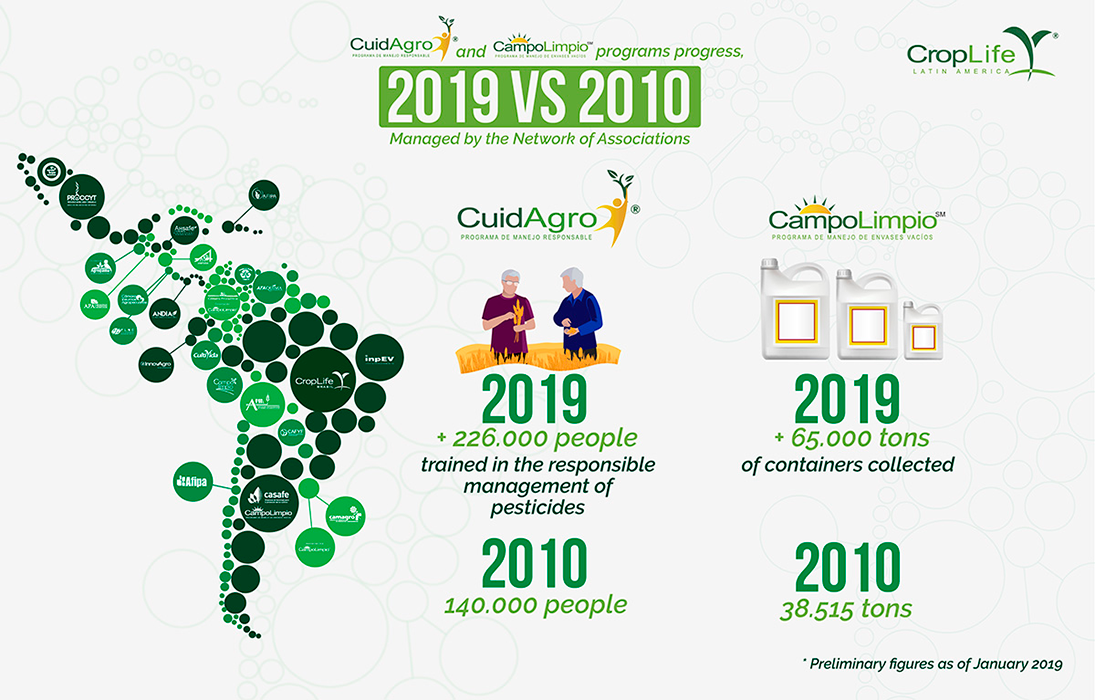
The use of a crop protection product or pesticide is not discretionary; there is no room for interpretations other than what is expressly indicated on the label and on its safety sheet. These products have been designed to be used following specific guidelines for storage, transport, mixing, application, and final disposal of the containers that once contained them. The above is essential for the sustainability of the agricultural activity as a whole, reducing the development of resistance, protecting the applicator, his family and the environment.
According to preliminary figures, more than 226,000 people were trained in the responsible management of pesticides in 2019 with CuidAgro®. The National Associations that reported a greater number of trained people were AGREQUIMA in Guatemala; CASAFE in Argentina, PROCCYT in Mexico and CAFYF in Paraguay.
As for the program for the responsible disposal of empty pesticide containers, CampoLimpioSM, more than 65,000 tons of containers were recovered; however, the final figure will increase because we continue to receive information from the National Associations.
Video on the responsible use of crop protection products: Excerpts from the interview conducted by MATINAL news in the Dominican Republic to Martín Zúñiga, Director for Central America and the Caribbean of CropLife Latin America, and Henry Monsanto, President of AFIPA.
Only available in Spanish
When an end user has benefited from the training of CuidAgro® and CampoLimpioSM., decision making is done in an informed manner. Effective training results in empowerment, followed by a change in behavior and development of a new habit, highlights Gabriela Briceño, Manager of the CuidAgro® and CampoLimpioSM.programs.
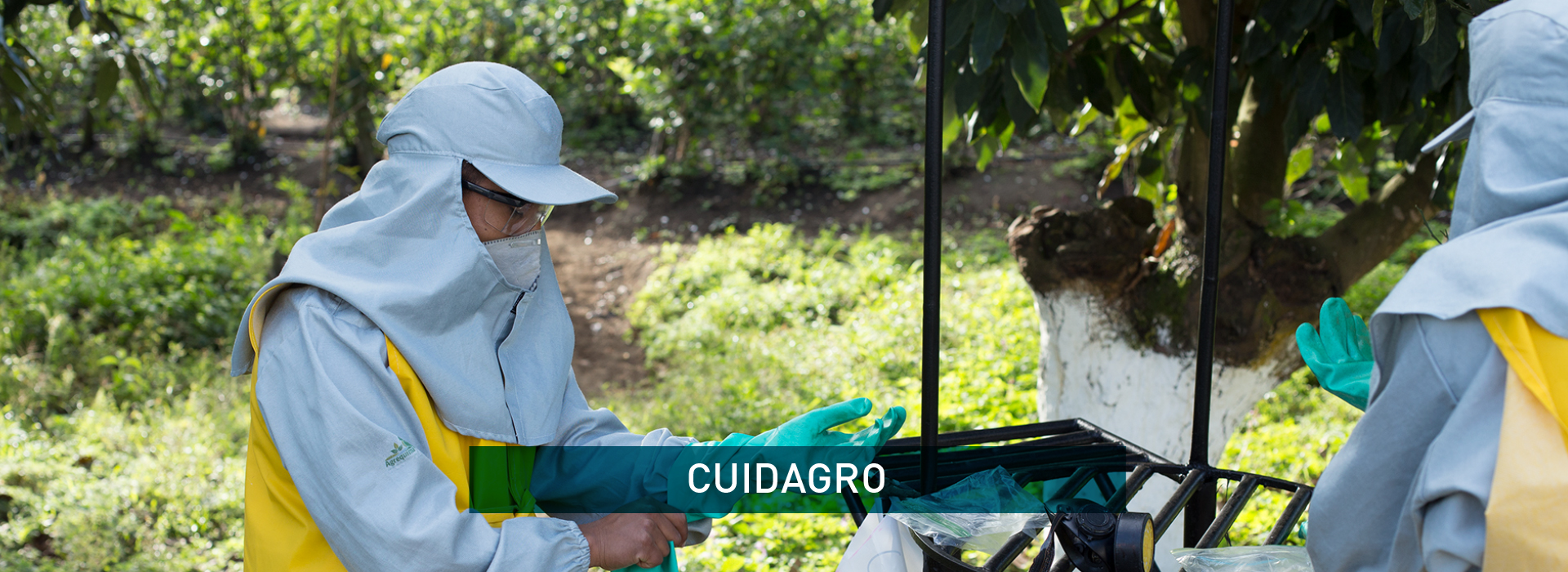
In 2019 CropLife Latin America promoted the use of Personal Protective Equipment (PPE). Last October, in a meeting with its network of Associations in Chile, a dialogue was generated with the Agricultural Institute of Campinas and the firm PROTECT, manufacturers of PPEs, with whom experiences in the region on the quality of the materials used for the elaboration of these were analyzed. In conclusion, the associations were made aware about the science behind the manufacture of personal protective equipment, backed by studies with scientific rigor on materials, adjuvants and designs of garments for the comfort and safety of the applicator.
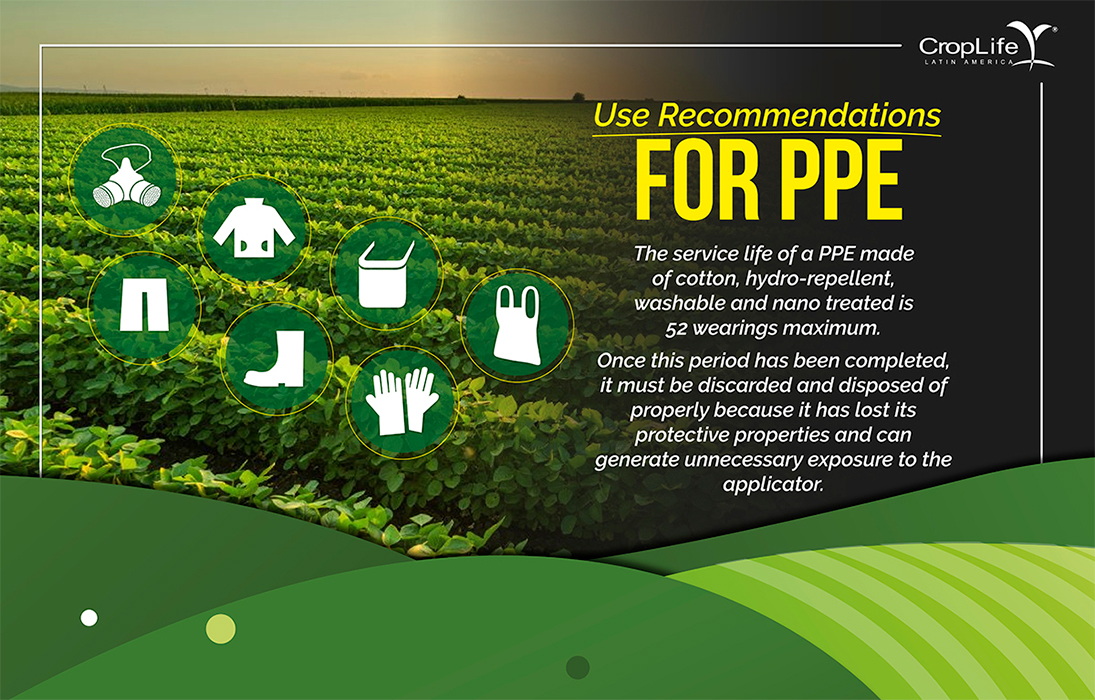
Brazil is a success story regarding the use of high quality Personal Protective Equipment. The reasons are:
1. Consistency between scientific research focused on materials and designs
2. Development and implementation of local legislation
3. Promotion of ISO quality certification processes.
The educational campaign in digital media to improve agricultural practices was highly welcomed by the CropLife Latin America community. The need to reiterate the messages to encourage better habits was proven through tests carried out on social networks.
Only available in Spanish
In Guatemala, AGREQUIMA continues to be the host of GLOBALG.A.P.; an alliance that has allowed it to certify vegetable exporters with LocalG.a.p. In 2019 Guatemala hosted for the first time the host of the GlobalG.A.P. TOUR which focused on conferences on the economic benefits of implementing Good Agricultural Practices. Additionally, AGREQUIMA continues to promote its online course: Food safety: good agricultural and manufacturing practices.
In Argentina, CASAFE, maintains its leadership in application and drift reduction demonstrations. In 2019 it trained more than 48,000 people.
Through a collaborative working group, Argentina issued the Interministerial Agreement on Good Application Practices for Crop Protection Products. We share some key elements that can serve as a guide in other countries of the region.
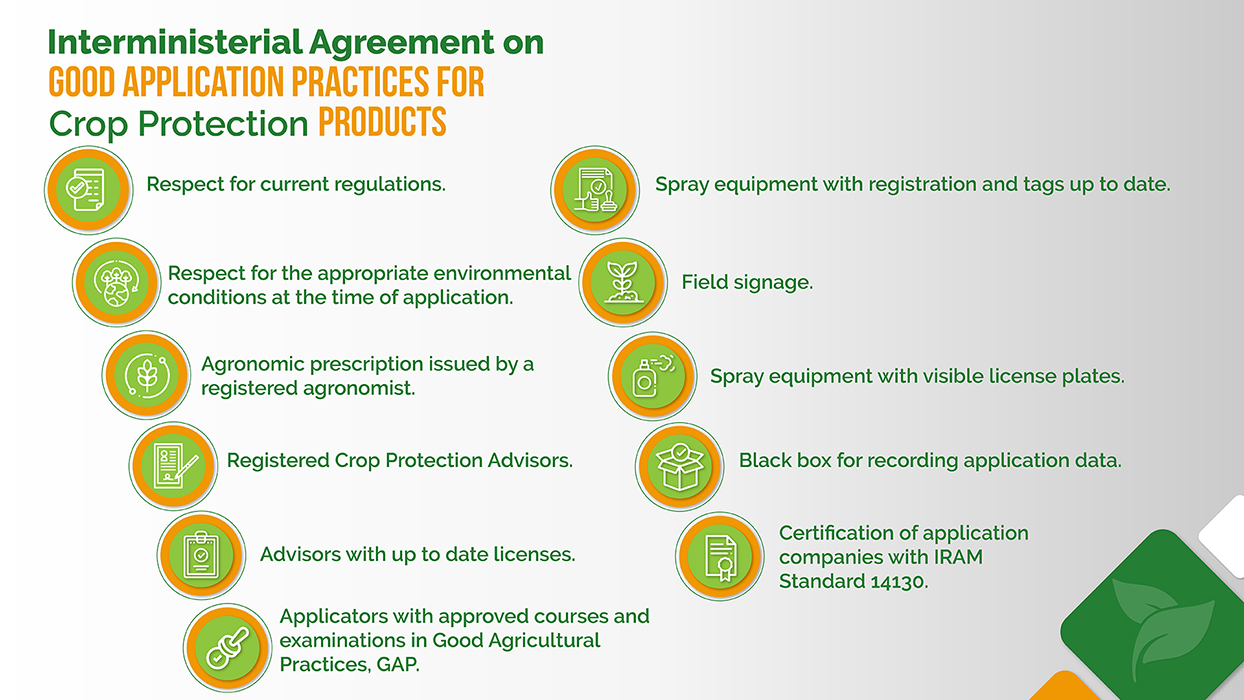
In Nicaragua, ANIFODA demonstrated its ingenuity and ability to build alliances under adverse conditions. It recovered more than 70 tons of empty containers and trained 4,000 people. Its success lies in the search for partners interested in meeting the Sustainable Development Goals in areas such as recycling, solid waste, water and sanitation, climate change, biodiversity, and environmental education. ANIFODA maintains a portfolio of more than 10 active alliances.
CropLife Latin America updated the training posters on Good Agricultural Practices which keep “Custodio” as its protagonist, which is now in tune with the Sustainable Development Goals and the protection of Biodiversity.
Only available in Spanish
CropLife Latin America’s training materials have been well received by different audiences. In 2019, the Brazilian publishing house FTD published the infographic on shared responsibility in an educational guide for schools. In Argentina, Massalin Particulares incorporated the video on Integrated Pest Management, MIP, in a training APP for tobacco growers.
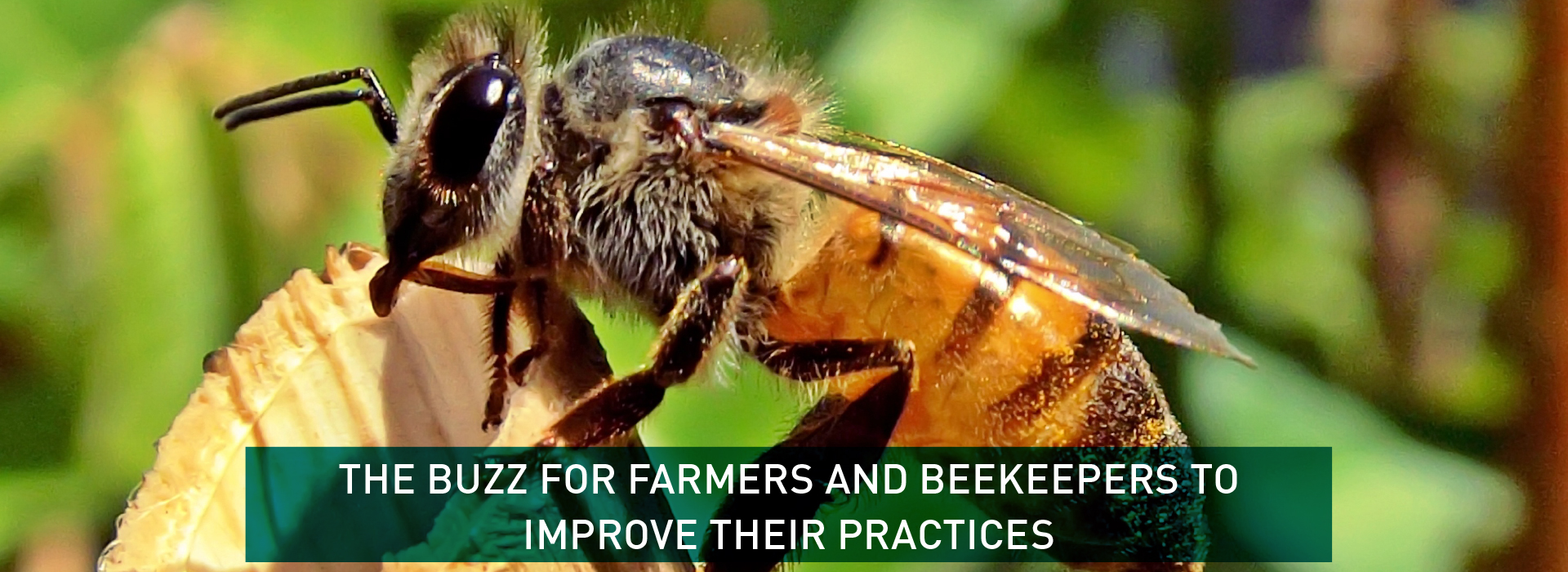
Good Agricultural Practice focused on protecting pollinators continued as a priority in 2019. Discussions in some countries in the face of pollinator risk scenarios not only involve improving beekeeping and agricultural practices, but also promoting monitoring efforts. CropLife Latin America participated and supported workshops on this topic in Peru, Colombia and Argentina.
In Colombia, ProCultivos, ANDI, continued with its training sessions for beekeepers and farmers to improve their practices and protect pollinators. In addition, it published the Protocol for the sampling of honey bees (Apis Mellifera) and other hive materials for toxicological and sanitary analysis, which will allow greater rigor when investigating accidents in hives.
In Argentina, a Risk Assessment Guide for Bees was designed in a collaborative roundtable with local authorities, CASAFE and CropLife Latin America. The Guide will be available in the coming weeks.
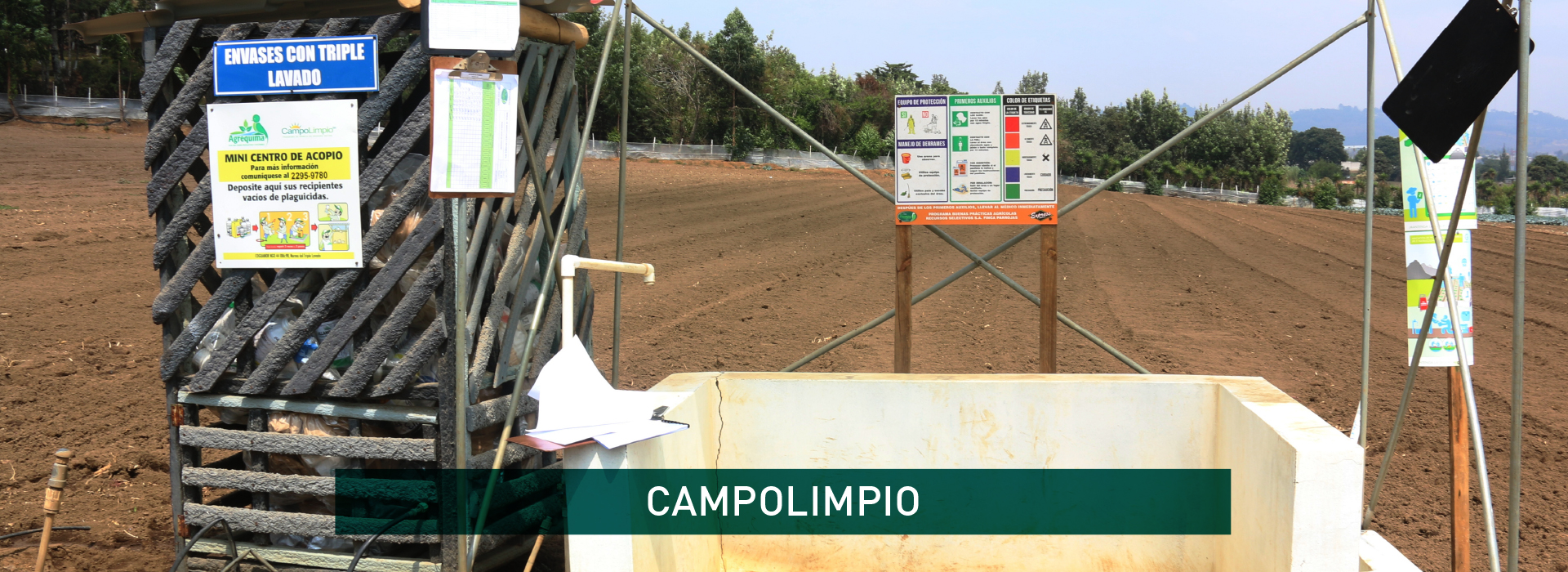
In Latin American there is a marked trend towards the unification of the container recovery program and its embrace by governments through agreements or laws. Initiatives in the Dominican Republic, Chile, Argentina and more recently Honduras marked conversations between the public and private sectors. The industry recognizes and appreciates this integration, and in fact promotes it as one of its objectives in 2020.
Corporación CampoLimpio Colombia continues to position its ECO-TUTORES within its National Circular Economy Strategy (ENEC). This initiative involves 30 municipalities, 3 departments, 25 farmer associations, 5 production unions, private companies and society in general, and more than 250,000 units have been delivered in the last two years.
A new collection center was inaugurated in the Dominican Republic, thanks to an agreement between AFIPA, ANINPA and the Ministry of Agriculture. The CampoLimpio Argentina Foundation opened the Center for Temporary Storage (CAT) Sofeva in Pergamino.
CampoLimpio Uruguay advances for the third consecutive year with a Drawing Contest, a low-cost initiative with a reach of 72,000 people a year through the use of social networks. It is a mechanism to raise awareness of environmental responsibility in rural communities, which involves local authorities.
AMOCALI in México showed positive results with metrics in the increases in the recovery of empty containers and training.
Its proposal includes:
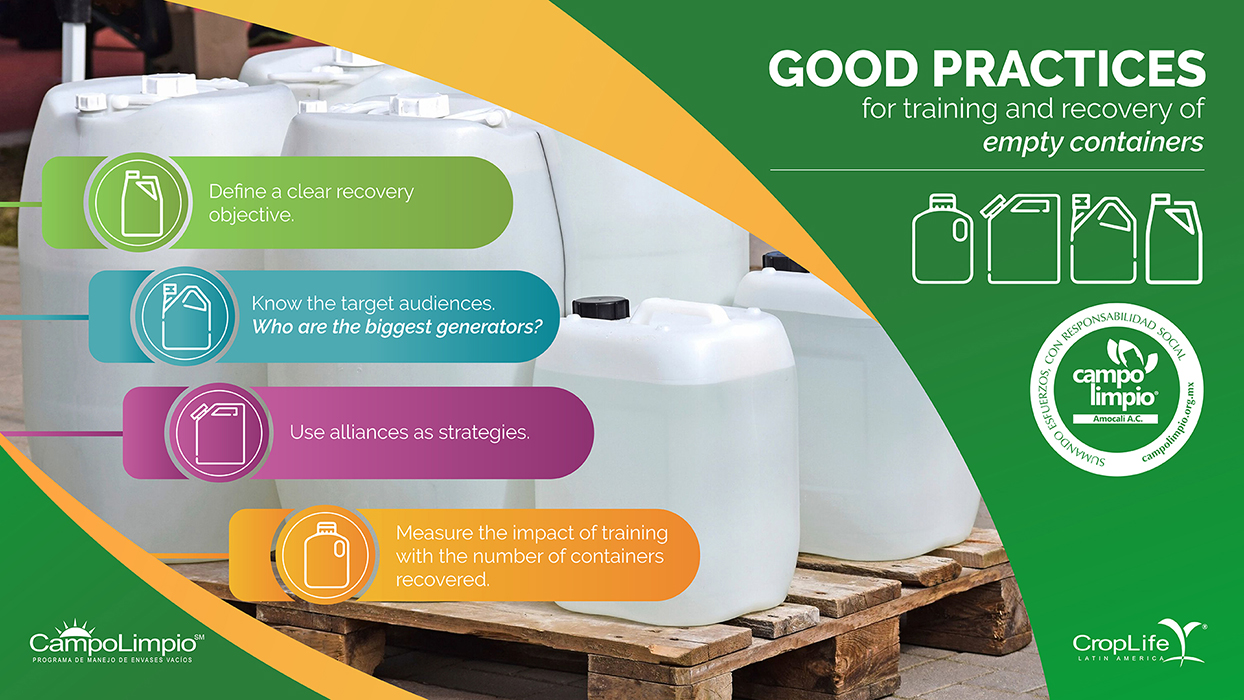
The success of the disposal program for empty pesticide containers in Brazil, led by inPev, was presented in Shanghai at the global Container Management meeting organized by CropLife China and CropLife International. China will initiate an ambitious project to give an environmentally responsible destination to empty pesticide containers and implement a model similar to that of inPev.
Get to know the photo gallery for CuidAgro®, trainings, container collection days and some CampoLimpioSMcollection centers.